Aramark and the Fight for a Food Sovereign Campus
Concordia’s Food Service Provider Is Under Increasing Scrutiny as Contract Expiration Nears
If you weren’t paying attention, you’d probably never notice them. The little white Aramark vans with the silhouetted red figure on the side pull in and out of Concordia each day, bringing supplies and ingredients to campus cafeterias and cafés.
But many students, preoccupied with the stresses of academic life, might be unaware that behind the scenes, this corporation is at the heart of a contentious debate on ethics, health, and institutional food autonomy.
Aramark is Concordia University’s primary food-service provider and it operates the majority of the cafeterias, cafés, and food franchises on campus. The corporation, a Fortune 500 company, serves nearly two billion meals a year in institutional facilities around the world.
As a result of Aramark’s corporate behaviour both in North America and abroad, however, student activists at universities around the world—including Concordia—have decried Aramark as a company that does not belong on their campuses.
Founded in 1936 by brothers Davre and Henry Davidson, Aramark was originally a modest operation engaged in small-scale vending services. Today, the company is a multinational behemoth that services over 500 prisons and detention centers in the United States alone, some of which also house migrants and asylum claimants.
Aramark has been repeatedly implicated in serving detainees and prisoners rotten and maggot-ridden food and accused of drastically cutting portions to maximize its profits. It has also been at the centre of a long list of labour disputes and has spent a fortune in unpaid wage settlements, the most recent being a $21-million payout announced on Nov. 8, 2019.
Allegations of insufficient staffing, price fixing, unhygienic practices, falsification of records, and gross negligence have plagued Aramark for decades, as well as other issues that transcend food quality.
In Ireland, for instance, Campbell Catering, Ltd., an Aramark subsidiary, fully operates and administers three of the country’s 37 “direct provision” migrant housing facilities. This system has been characterized as “institutionalized poverty and social exclusion” by the Irish Refugee Council, a Dublin-based asylum-seeker advocacy group.
“It is, in effect, a cash cow for those private companies who operate within it,” Irish parliamentarian Donnchadh Ó Laoghaire said of the system in a policy statement. “It’s a highly profitable model, profiting from the hardship and misery of others.”
This is the core criticism of Aramark advanced by student activists pushing to deny the company commercial spaces within their universities—a movement taking hold on campus at Concordia.
“We do not want multinationals like Aramark on our campus,” said external coordinator of the Concordia Food Coalition Nora Fabre. “They have a very poor track record.”
The CFC is looking to present a counter-proposal in May 2022 when Aramark’s contract expires.
“We’re starting to seriously prepare for the request for proposals,” Fabre said. “That will be an opportunity for students to organize and mobilize and change the contract for the food service provider.”
Recently, student activists at New York University forced Aramark out of their campus through a direct-action pressure campaign that included protests and the occupation of campus spaces.
This success story has Concordia activists feeling emboldened.
“There’s certainly an arc towards escalating our tactics,” Fabre said, although the CFC knows it must also present a unified, practical operational proposal in order to seize the contract from Aramark.
Student initiatives reimagine campus food service. One model of what that proposal could look like already exists on a smaller scale at the People’s Potato, a collectively-run kitchen that serves free food every school day in Concordia’s Hall Building.
“Our number one mandate is to feed students healthy food,” said People’s Potato collective member Karen Ounsworth.
People’s Potato is a non-profit fee-levy group, which means that it receives operational funding from voluntary student fees that are calculated on a cost-per-credit basis. These fees add up to roughly $5 a semester for full-time undergraduate students.
“Our budget is around $320,000 a year, and with that we’re able to pay ourselves, to buy all the food, and to fix things when they need to be fixed,” Ounsworth explained.
To put that in perspective, the more than 900 students living in residences at Concordia are required to buy into a mandatory, Aramark-administered meal plan that costs $4,695 a head per year— at full capacity, that’s $4,248,975 per year.
Meanwhile, People’s Potato serves free meals daily throughout the same period at a fee-levy cost of around $10 per year, per student. Ounsworth estimates they currently serve between 400 and 500 meals a day.
But the emphasis is not only on serving food. People’s Potato is a grass-roots, participatory project. All employees are paid equally, though they do rely heavily on volunteers.
“The number one thing that we provide is a community space,” Ounsworth said. “We offer the opportunity for you to feel like you’re part of something bigger than going to school and just trying to survive.”
A student-led organization like People’s Potato is just one vision of what a post-Aramark food landscape could look like.
“There are other ways to understand food service contracts,” said Erik Chevrier, a Concordia instructor who specializes in food studies and social economy. “Concordia basically outsources them, but there are a number of schools that have actually internalized them.”
Chevrier cited the University of Toronto and the University of Winnipeg as examples of Canadian universities that have internalized their food-service systems, working with local chefs and co-operatives that create more nutritious meal plans and focus on sustainability and local procurement.
These approaches are better than the services of a massive corporation whose only interest is its bottom line, Chevrier argued. “The university could have a stake to co-create a more food-sovereign situation on campus.”
Aramark’s position is that the status quo is working for the populations it serves, including students.
“As one of the world’s largest food service companies, we believe that all of our customers deserve healthy, nutritious meals whether they are students, business people, fans, patients, or offenders,” said Aramark’s Vice President of Corporate Communications, Karen Cutler.
But in the hundreds of prisons in which Aramark operates, the “offenders” aren’t Aramark’s customers, Chevrier argued. And since Concordia students who live in residence are not given a choice as to whether or not they buy into the Aramark meal plan, they aren’t either.
“If you look at these food service corporations, they basically serve public institutions,” Chevrier said. “They serve prisons, they serve the military, they serve hospitals, they serve student residences, and in each case, their markets are captive markets. Their number one condition is ‘How do I profit the most off of these situations, and how do I maximize the amount of money that’s coming in while providing as little as possible?’”
When the time comes to decide whether or not Concordia will renew its contract with Aramark, the administration will have to make a choice: Do they want to maintain a partnership with a faceless multinational with a record of prioritizing its bottom line above the most vulnerable among us, or are they ready to work with student groups and community organizations in pursuit of a food-sovereign campus?





_600_375_90_s_c1.jpg)
4_600_375_90_s_c1.jpg)